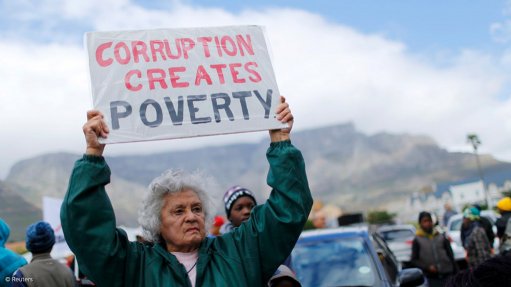
Photo by: Reuters
Global coalition against corruption Transparency International on Tuesday released its 2018 Corruption Perceptions Index, and gave South Africa a score of 43 out of 100, unchanged from 2017.
The index uses a scale of 0 to 100, with 0 being extremely corrupt, and is regarded as the leading global indicator of public service corruption.
South Africa ranked 73 out of 180 countries. The best performing country was Denmark with a score of 88 and the worst preforming country was Somalia, with a score of 10.
Transparency International revealed that more than two-thirds of the countries assessed scored below 50, with an average score of 43.
“Perhaps most disturbing is that the vast majority of countries assessed have made little to no progress. Only 20 have made significant progress in recent years,” it said.
Civil society organisation Corruption Watch said South Africa’s unchanged score indicated that the perceptions of corruption remained high and that the country needed to make serious inroads against corruption.
Corruption Watch executive director David Lewis said the country’s experience of State capture was an example of the relationship between corruption and the undermining of democracy.
“We have seen how, in order to loot public funds, the perpetrators have had to undermine those key pillars of democracy that are responsible for holding those in power to account. The undermining of Parliament and the criminal justice institutions are key cases in point. On the other hand, we have also seen how institutions that reflect the strength of our democracy such as civil society organisations, the media and the courts have been critical features of the fightback against State capture,” he pointed out.
As a region, sub-Saharan Africa remained the worst performing, failing to translate anticorruption commitments into real progress, such as declaring 2018 the African year of anticorruption.
“A region with stark political and socioeconomic contrasts and longstanding challenges, many of its countries struggle with ineffective institutions and weak democratic values, which threaten anticorruption efforts,” said Transparency International.
However, countries such as the Seychelles, Botswana, Cabo Verde, Rwanda, Namibia, Mauritius, Sao Tome and Principe and Senegal all ranked above South Africa.
Lewis added that the Seychelles and Botswana have relatively well-functioning democratic and governance systems, which contributed to their scores of 66 and 61, respectively.
“One could argue that South Africa, too, has many of these attributes, as well as an independent media and provision for civil society organisations to speak out, and yet there has been no improvement in the score. Once again, one would have to point to the persistent failure of our criminal justice institutions to impose consequences upon corrupt individuals,” he said.
However, South Africa fared better than some of its Brics counterparts in the index, with Russia scoring 28 with a rank of 138, Brazil scoring 35 and ranking 105, China at 39 with a rank of 87 and India scoring 41 and ranking 78.
Corruption Watch called for bold measures to remove corrupt officials from office and for tangible action following declared commitments to fight corruption.
Lewis believes that South Africa did not rank lower owing to public outrage at the levels of corruption in the country.
“We see this in the number of reports received by Corruption Watch from people determined to expose corruption wherever they find it, and we have complete faith in the public to continue to do so,” added Lewis.